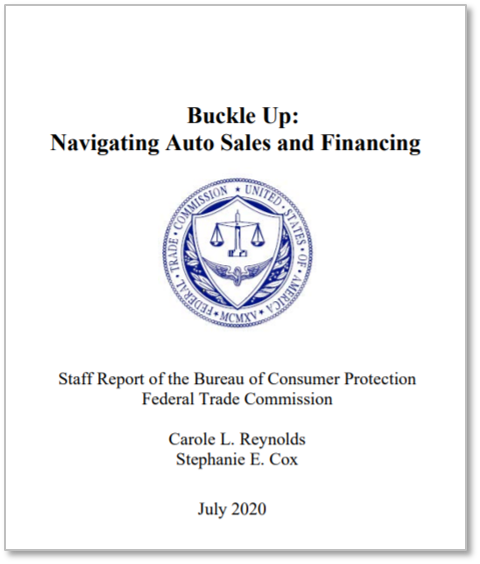It’s one of the biggest purchases people make, but two new FTC staff reports examine some common pitfalls when consumers are in the market for a car. Buckle down and read the Bureau of Consumer Protection’s Buckle Up: Navigating Auto Sales and Financing, which focuses on the challenges buyers face in getting accurate, understandable information when shopping for a vehicle. Not in the auto business? Not so fast. The deep-dive analysis of Buckle Up and an accompanying report by BCP staff and the Bureau of Economics – The Auto Buyer Study: Lessons From In-Depth Consumer Interviews And Related Research – offer insights into the perception and behavior of consumers in the study that can apply to other industries.
The FTC’s interest in auto-related transactions goes back decades. (Check out Volume 1 of Federal Trade Commission Decisions for a 1919 case regarding deception in the sale of auto parts.) The FTC has brought law enforcement actions challenging illegal practices, held workshops and roundtables to hear from consumer groups and industry members, and educated buyers and sellers about their rights and responsibilities. One notable feature about the two new reports is that FTC staff went straight to the source and based their views, in part, on detailed interviews with consumers about their experiences when buying and financing a vehicle.
 You’ll want to read Buckle Up from bumper to bumper, but one key finding is that consumers may be unaware of key terms in sales and financing contracts. One reason may be the extent to which the negotiations process focuses primarily on the monthly payment. That approach can leave consumers in the dark about other important – sometimes even more important – financial variables like the down payment, the length of financing, the total sales price, and the annual percentage rate.
You’ll want to read Buckle Up from bumper to bumper, but one key finding is that consumers may be unaware of key terms in sales and financing contracts. One reason may be the extent to which the negotiations process focuses primarily on the monthly payment. That approach can leave consumers in the dark about other important – sometimes even more important – financial variables like the down payment, the length of financing, the total sales price, and the annual percentage rate.
So let’s say the consumer has decided on a vehicle and has come to an agreement on the price. All done? Consumers may think the checkered flag is in sight, but for the dealership, negotiations have just begun. First, as the report suggests, “price” can be an elusive concept in the context of car buying. Does it mean sticker price, out-the-door price, total sales price, or something else?
Furthermore, it’s often in a last-lap meeting in the financing office that dealers raise the issue of add-ons – purchases like extended warranties, service plans, credit insurance, GAP policies, window etching, etc., that can add substantially to what consumers walking into the office thought the price was. Add-ons also may have limits or conditions and may not cover what consumers expect.
The staff report suggests several reasons why add-ons were the single greatest area of confusion for consumers who participated in the study. According to the report, the talk turned to add-ons only after long hours (or days or weeks) of negotiations left consumers feeling both pressured to close the deal and confused by the details. Even the very nature of the products left many consumers bewildered. Are these add-ons mandatory? Are they free? Is the cost included in what consumers perceive as the already agreed-upon price? Does the dealership’s practice of bundling – offering add-ons as a package – mean buyers can’t pick and choose the add-ons they want?
What about consumers’ opportunity to review the purchase and financing paperwork? As the report notes, “[T]he length of the auto-buying process, the amount of paperwork involved, and the technical industry jargon often coalesce to make meaningful review and engagement a challenging task.” Participants in the study cited the exhausting negotiation process, a sense of feeling rushed at the end, information overload that left some of them “overwhelmed,” and the difficulty of reviewing documents on a tablet or other device.
The BCP-BE report that accompanies Buckle Up details the methodology of the study and puts it in context with existing research. The report underscores that many consumers in the study didn’t know they could negotiate terms of the deal other than price and trade-in. It also highlights the need for consumer education about add-ons.
Visit the Business Center’s Automobiles page for more information of interest to industry members.
